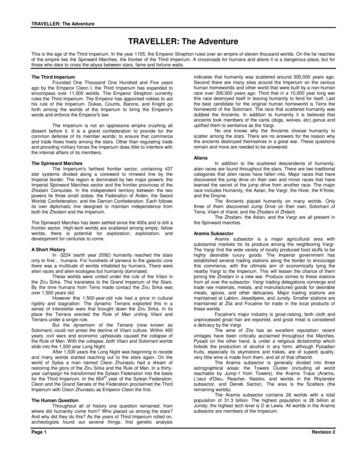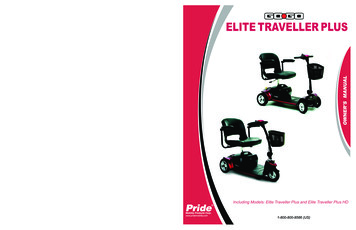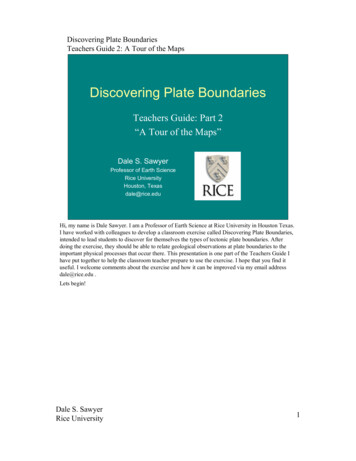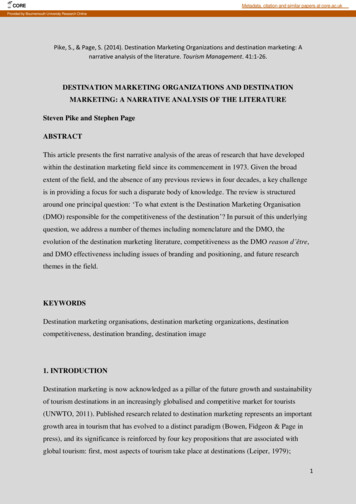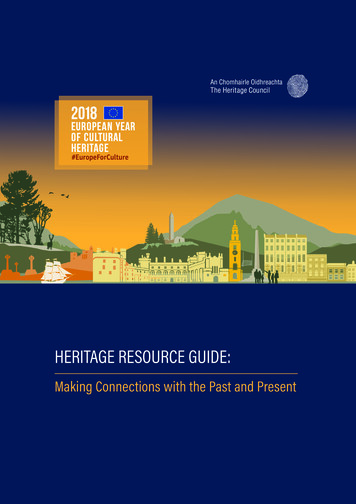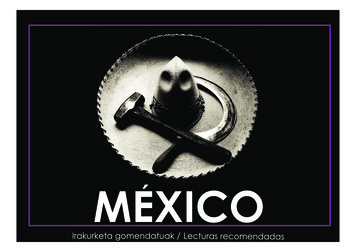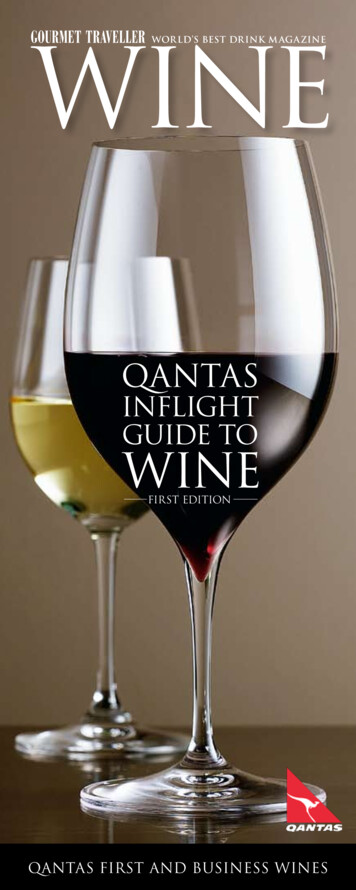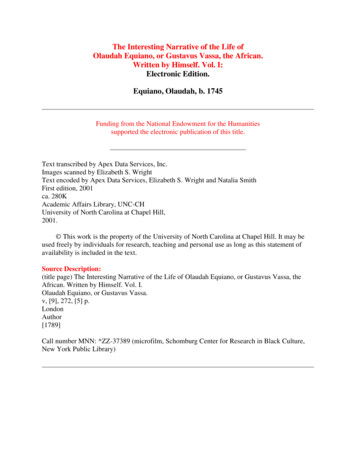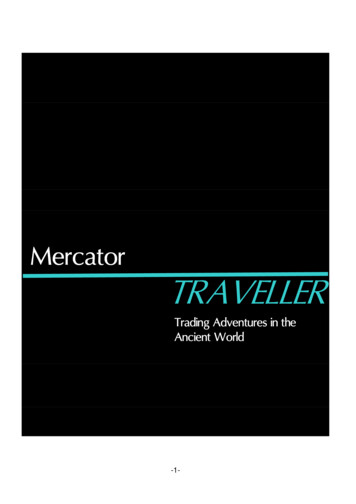
Transcription
MercatorTRAVELLERTrading AdventuresAdventures in theAncient World-1-
MercatorTRAVELLERTrading Adventures in theAncient World-2-
MERCATORCopyright Paul Elliott 2009Traveller is copyright Far Future EnterprisesThis book is a fan product, unendorsed by FFE and not intended for publication.Illustrations are from Axel Nelson’s maritime site: http://www.axelnelson.com/skepp/corbita.htmContact Paul Elliott at zozer@btinternet.comThese add on rules require the following books: Traveller Book 1, 2, 3, 4 and 5, andSupplement 4.-3-
Table of ContentsINTRODUCTIONCHARACTERSCOMBATSAILINGSHIP ECONOMICSSPECULATIVE TRADESHIP DESIGNSNAVAL COMBATENCOUNTERSPORTS AND PROVINCESEQUIPMENT-4-
IntroductionAlthough Traveller concerns itself with interstellar travel, piracy,misadventure and dubious heroics along the starlanes, it is at itsheart a simple generic system. It has to be, to cover tech levelsranging from stone age to an era of floating cities.It is the game's unique trade and travel system, however, that isits real strength. Transferred to Earth's ancient world, Travellershould prove successful, capturing the spirit of sea travel, hagglingdockside at Caesarea instead of Glisten, fleeing from customsboats off of Corinth instead of Rhylanor. Traders in the Romanempire criss-crossed the Mediterranean, keeping the imperialeconomy alive and thriving, middlemen, sailors, chancers, veteransall trying to make an almost honest living.Mercator is, then, an attempt to transport Traveller's ethos andgame systems almost directly to the Roman Empire in the 1st and2nd centuries AD. The Third Imperium becomes the Roman Empire,Regina becomes Alexandria, and goods like dried fruits or fishsauce are traded instead of machine parts or radioactives.Many of the plots, stories and adventure hooks written forinterstellar Traveller still work handsomely for a Roman campaign.Scams, smuggling, theft, ambush, raids, piracy and so forthtranslate easily between universes.This shouldn't be taken as an accurate historical RPG version ofimperial Rome, but it isn't a magical fantasy, either. Mercator issupposed to be a game of adventure, and the Roman Empire is awell known and familiar world full of tropes, adventure seeds andabove all inspiration!- Paul Elliott-5-
CharactersThe rules of Mercator use the character creation rules found inTraveller Book 1 and also in Supplement 4: Citizens of theImperium.CHARACTER GENERATIONCharacters have six basic characteristics, Strength, Dexterity,Endurance, Intelligence, Education and Social Standing. Socialstanding is a measure of standing in Roman society only. Allcharacteristics are rolled on 2D, except for the education ofBarbarians which is rolled only on 1D.Names: The poor and slaves use a single Latin name. Those ofhigher means or aspirations (Soc 6 ) take three names; thepraenomen (forename), nomen (family name) and cognomen(personal name, or additional family identifier). Women simply taketheir father's nomen (but with the ending 'a', rather than 'us'). Sistersall had the same name, although sometimes they were numbered,Prima, Secunda, etc . giving Julia Prima, Julia Secunda, etc.A non-citizen becoming a citizen takes a Roman name, thepraenomen and nomen of the emperor, with the citizen's old name.Sailors, particularly in the east areNOBLE TITLESGreek, and take Greek names.Titles: Any character of social B 11 Tribunestanding B(11) or more comes from C 12 Quaestora family with great standing and D 13 Praetorprobably also influence and wealth, E 14 Legatethe titles are taken from the Roman F 15 Proconsulcursus honorum and represent the families highest achieved officein government. A tribune is a junior legionary officer, a legate is alegionary commander (a general), and a proconsul is a provincialgovernor. These offices might be hereditary in Mercator instead oftemporary.-6-
CAREERSThe procedure for joining a career is detailed in TravellerBook 1, with only minor modifications. There is no draft. The agingprocess is instituted as normal, GMs can include a -1 DM if desiredreflecting harsher living conditions. Retirement and commensuratepension exists only for Legion, Auxiliary, Navy and Noble, Thecareer types available are:Legion: Members of the front-line Roman fighting forces, toughinfantry soldiers skilled in siege war, mass combat and militaryconstruction. Soc 6 only.Auxiliary: Members of the non-citizen force that carries outpatrols, police actions, scouting and cavalry attacks. Soc 5- only.Navy: Members of the imperial fleet, patrolling the MareNostrum in search of pirates, manning war galleys and attackingenemy ships.Merchants: Men of the sea, sailors out to make their fortunestransporting goods from port to port. These sea dogs have a storyto tell, and a girl in every port.Noble: Members of the wealthy elite. At lower levels these sit oncity councils, but at the upper levels they form the richest families inRome, families both ancient and revered. They form thegovernment of the empire.Rogue: Criminal elements familiar with the rougher or moreillegal methods of accomplishing tasks.Barbarian: Rugged individuals from outside the empire, noncitizens who are warlike and uncivilised. Begin term 1 at age 14.Other: The Other are craftsmen, townsmen and other citizensnot represented in the seven careers above. The exact nature ofthe career of any specific character in the Other field must bededuced from the skills and benefits received during charactergeneration.-7-
LegionAuxiliaryNavyMerchantsEnlistment9 6 5 7 DM 1 ifDM 2 ifStren 6 Endur 9 Endur 8 Dext 6 Endur 6 Intel 7 Stren 7 Intel 6 Survival6 6 5 5 DM 2 ifStren 7 Endur 7 Intel 7 Intel 7 Position9 8 10 4 DM 1 ifEduc 7 Educ 7 Endur 7 Intel 6 Promotion8 7 8 10 DM 1 ifSoc 8 Intel 8 Educ 7 Intel 9 Re-enlist5 6 6 4 The legion career is open only to persons with Social 6 ; the auxiliary career is open only topersons with Social 5- (although their characteristic may rise).TABLE OF RANKSRank 1Rank 2Rank 3Rank 4Rank 5Rank 6TesserariusSigniferOptioCenturionPrincepsPrimus sserariusSigniferOptioCenturionCaptainNavarchus4 Officerrd3 Officernd2 Officerst1 OfficerCaptain-Deck Psg 1 Intel EducBladeBow 1 Social105050100100200200Deck Psg 1 Intel 1 EducBladeBladeShip1050100200200400-MUSTERING OUT TABLESBenefits 1Table234567Cash1Table234567Deck Psg 2 Intel 1 EducBladeBlade 2 Social205050100200300400Deck Psg 1 Intel 1 EducBladeBow 2 Social2050100100100200200-8-
ACQUIRED SKILLS TABLEPersonal Development Table123456LegionAuxiliaryNavyMerchants 1 Str 1 Dex 1 End 1 IntGamblingBrawling 1 Str 1 Dex 1 End 1 IntGamblingBrawling 1 Str 1 Dex 1 EndGamblingBrawlingCarousing 1 Str 1 Dex 1 End 1 StrenBlade CbtBriberyTeamsterSurvivalBlade CbtReconBlade CbtBrawlingBlade CbtBow CbtBlade CbtSmall CraftSmall CraftArtillerySmall lotCarpentrySmall CraftArtilleryNavigationShip TacticsStreetwiseSmall CraftCarpentryNavigationPilotMedicalService Skills123456TeamsterSurvivalBlade CbtReconBlade CbtBrawlingAdvanced Education de CbtSiege CbtRidingSurvivalReconTacticsBlade CbtBow CbtAdvanced Education Skills (only allowed if education 8 )123456MedicalLeaderTacticsCombat EngLeaderAdminMedicalRidingTacticsCombat igationCharacters consult this set of tablesduring each term of service. Acharacter must have an educationcharacteristic of 8 or greater beforeusing the fourth table.Blade combat and artisan call foradditionalspecificationbythecharacter riberyAUTOMATIC SKILLSLegion . Sword-1Auxiliary . .Spear-1Navy Captain. . Navigation-1stMerchant 1 Officer.Pilot-1Merchant Captain . Navigation-1-9-
EnlistmentNobleRogueBarbarianOther(special)6 5 7 Social 8Endur 7 Endur 9 Stren 10 Stren 7 Intel 6 DM 1 ifDM 2 ifSurvival3 6 6 5 DM 2 if-Intel 9 Stren 8 Intel 9 Position5 6 DM 1 ifEduc 9 Stren 10 Promotion12 9 DM 1 ifIntel 10 Intel 6 Re-enlist4 5 6 5 Noble career is open only (and auitomatically) to persons with Social 10 . Rank corresponds tonoble rank once position has been achieved.TABLE OF RANKSRank 1Rank 2Rank 3Rank 4Rank 5Rank 6B TribuneC QuaestorD PraetorE LegateF Proconsul--WarriorChief--Deck PsgBladeBladeBladeDeck PsgDeck Psg10203040-Deck Psg 1 Intel 1 EducBladeDeck Psg10501001001005001000MUSTERING OUT TABLESBenefits 1Table234567Cash1Table234567Cabin PsgCabin PsgBladeBlade 1 EducShip10020040060060010001000Deck Psg 1 SocBladeBladeCabin Psg 1 Soc201004004001000-10-
ACQUIRED SKILLS TABLEPersonal Development TableNoble123456 1 Stren 1 Dext 1 Educ 1 IntelCarousingBrawlingRogueBarbarianOther 1 Stren 1 Dext 1 Endur 1 IntelBrawlingCarousing 1 Stren 2 Stren 1 StrenCarousing 1 Dex 1 Endu 1 Stren 1 Dext 1 Endur 1 Intel 1 Educ 1 SocialBlade CbtBrawlingRecruitingRidingGamblingBlade CbtBrawlingBlade CbtBlade CbtBow BriberySmall CraftBlade CbtRidingSurvivalReconHuntingBow ervice Skills123456Bow CbtBlade CbtHuntingRidingBribery 1 EducAdvanced Education Skills123456PilotSmall CraftRidingNavigationCombat acticsAdvanced Education Skills (only allowed if education 8 Characters consult this set of tablesduring each term of service. Acharacter must have an educationcharacteristic of 8 or greater beforeusing the fourth table.Blade combat and artisan call foradditional specification by the character gJack-o-TradesMedicalCarpentryArtisan 1 SocialStreetwiseAdminAUTOMATIC SKILLSRogue . Streetwise-1Barbarian Warrior. Blade Cbt-1Barbarian Chief .Leader-1-11-
SKILLS AND BENEFITSThe mustering out benefits follow the same pattern as those inTraveller Book 1. A number of benefits may need furtherexplanation.Blade: Select a blade weapon. Not all the weapons listed inBook 1 are available. See the blades and polearms table on thispage for details.Travel Allowances: Money awarded at mustering out is listedas silver denarii. The deck passage and cabin passage awards areletters of recommendation, allowing the bearer to travel from oneport to another for free, although food and supplies must still bebrought on board by the character.Ship: Both the noble and the merchant career provide thecharacter with the chance to leave the service in possession of aship. Only one ship may be gained, further rolls of 'ship' must bererolled. This award is an adventure opportunity, it will form thebasis of their activities,BLADES AND POLEARMSwhether travel, trade,mercenaryworkor Weapon DM -DM Woundspiracy! it is advised that Dagger8 32Donly one character in the Shortsword 9 42Dplayers' group should Sword10 52Downaship.The Javelin9 42D/3D*character is responsible Spear9 42Dfor upkeep and crew Cudgel8 42Dcosts.* damage inflicted when thrownSkills: The skills awarded are taken from Book 1, 4 and 5 aswell as Supplement 4. Blade and Bow Combat are general skills,the exact weapon must be specified each time the skill is rolled.The following skills are called for using the character generationsystem:-12-
Artillery: The individual has been trained to operate torsion-powered artillerypieces used in siege warfare and naval combat.Artisan: The individual has apprenticed as a craftsman of some sort and isable to make his living pursuing his trade. Immediately select from: Baker,Leatherworker, Bronzesmith, Potter, Cobbler, Mosaic-maker, Plasterer,Tilemaker, Glassblower, Fuller, Tailor, Cutler or other similar trade. Note thatStonemason, Carpetry and Blacksmith are important trades with their own skills.Carpentry: The individual has apprenticed as a woodworker and may havedeveloped his skills making furniture, cabinets, wagons, ships or house frames.Carpentry is a valuable skill capable ofbeing transferred to many differentsituations.Blacksmith: The individual has apprenticed as a blacksmith and may havedeveloped his skills making door fittings, window grilles, parts for wagons orbarrels, tools, knives or even weapons and armour. To ply his trade the characterwould need a high heat furnace, and this could be improvised in the field as longas charcoal is available. In addition he would need various tools, and an ironingot in size similar to the item being fabricated.Riding: Since Equestrian is a social rank in Mercator, the equestrian skillfound in Book 6 has been renamed Riding. The individual has extensive trainingin the riding of horses, in their behaviour and care, and at higher levels of skill thecharacter can train horses.Siege Cbt: The individual has experienced siege warfare and is able to planand execute successful siege techniques, including the digging of siege mines,the construction of mobile siege towers, the use of battering rams, and of coursethe myriad ways to defeat these techniques.Small Craft: The individual is a skilled boatman and can handle himself in anysmall boat, from rowing boats, fishing boats, barges, rivercraft and smallsailboats to skiffs. This skill does not cover the control of galleys or large sailingships. For successful use of this skill, the character must stay within site of land.Stonemason: The individual has apprenticed as a stonemason and may havedeveloped his skills making curbstones and paving slabs for the municipalauthority, he may have built houses as part of a construction gang, he may havecarved expensive statues for wealthy clients, or he may have quarried stone andbuilt walls and forts during his time in the army.Teamster: The individual is able to control a team of oxen, mules or horsespulling together. They may be pulling a plough, a cart or a wagon. Teamster skillalso allows the character to care for the animals and beaware of changes inbehaviour. At higher levels the character is able to train animals to pull heavyloads and become part of a team.-13-
CombatThe combat system used in Mercator is identical to the onepresented in Traveller Book 1 with a number of minor changes.HAND-TO-HAND FIGHTINGIn the ancient world hand-to-hand warfare was prevelant. Thereferee should make himself familiar with those rules regardingblade combat, in particular endurance (pg.35), morale (p.36),drawing and throwing blades (pg. 42). There are three additionalrules:Shields and Parrying: In Traveller Book 1 a character's skill inhis current blade weapon was subtracted from his opponent's roll tosimulate the process of skilful parrying. In the ancient world thatprocess is instead replaced by the ubiquitous shield. There is noshield skill per se, a combatant with a shield uses his current bladeskill to as his parrying DM. Only characters with shields can nowuse their skill to parry. See Book 1, pg, 35 for further infor-mation. Atypical oval shield costs 20 denarii and weighs 4000g.Throwing Javelins: Daggers can be thrown as per Book 1rules. A new weapon has been introduced, the ubiquitous ancientjavelin. This is a light spear capable of being used as a spear, andalso capable of being thrown out to short range. Throw 18 to hit ;DM dexterity, javelin skill, -target evasion DM if evading. If a hit isachieved the wound is 3D. Retrieval of the javelin requires oneround at close range with the target.BOW WEAPONSThe ancient world has two main types of bow, the self bow,equivalent to Traveller's short bow, and the powerful recurve bowmade up of composite materials, horn, wood, sinew and glues. Itisa military bow; use the characteristics and information for the longbow, but remember that a recurve bow is only 800mm long.-14-
There are no crossbows in the ancient world as represented inSupplement 4. That said, a small ballista (the arcuballista) doesexist which is comparable in performance to the military crossbowof Supplement 4. It requires a light field tripod (weight 8kg) and hasan integral winding mechanism. Count the arcuballista as a militarycrossbow with cranequin fully integrated (add the weights andprices together). Three men are required to carry the arcuballista,two to carry the bow-frame and one to carry the tripod.Note that the author is a practised slinger , the 2D damage listedfor the sling in Supplement 4, comparable with an arrow or sword iscorrect.ARMOURArmour is important in ancient warfare. Traveller has three armourtypes roughly comparable in effect to ancient armours - Jack, Meshand Cloth. All armours are assumed to be worn with a metalhelmet. In Mercator the armours available to characters are:Leather (20 denarii): A thick leather shirt with protective fringe,worn by scouts, skirmishers, sailors, charioteers and as an undertunic beneath all heavier types of armour (assumed).Chainmail (400 denarii): A shirt of heavy iron rings that defendswell against cutting blades, very mobile but very heavy. It is alwaysworn over a leather tunic (included) to protect against blunt trauma.Scale (600 denarii): A shirt of overlapping bronze scales, whichdoes not allow the freedom of movement of chainmail, but it ismuch lighter - perfect for cavalry troops.Segmentata (1000 denarii): An expensive armour of curvedmetal plates that has been developed for the legions. Not alllegionaries have been allocated a suit. The bands of iron cover thechest and shoulders only. Heavy and expensive, difficult to repair inthe field.-15-
BODY ARMOURTypeEquivalent Price eMesh6005,000SegmentataCloth1000 8,000NEW WEAPONSJavelinShortswordSelf BowRecurve BowArcuballistaas Spear -1can be thrownas Bladenot thrownas Short Bowas Long Bow length 800mmas Crossbow militaryEXAMPLE CHARACTERSAuxiliary Centurion Gracchus9B5774 Age 34 4 terms 220dSpear-2, Sword-2, Bow-1, Recon-1 Sword, Bow, Deck PsgNavy Sailor PertinaxB87777 Age 28 2½ terms 250dCarpentry-1, Small Craft-1, Dagger-1Quaestor Lucius Admetius Fulva 49669C Age 46 7 terms 1100dTactics-2, Sword-3, Jack-of-Trades-1, Admin-1, Small Craft1, Leader-1, Navigation-1, Bribery-1, Riding-1 Ship, SwordRogue Claudius Aquila774987 Age 34 4 terms 1100dStreetwise-3, Shortsword-1, Leader-1, Liaison-1 Cabin Psg-16-
SailingMost travel in the ancient world is by way of the sea, the cities,cultures and provinces of the Roman Empire are all clusteredaround Mare Nostrum ('Our Sea') making sea travel very costefficient. Each province of the empire produces goods that areneeded elsewhere and a network of well-travelled of trade routeshas sprung up. While the army moves from one end of the empireto another by road, linen, gold, incense and fish sauce invariablytravels by ship.Sea travel usually involves the individual's own vessel, or acharter. Scheduled services are rarely available. If a cargo needs tobe shipped to Corinth a merchant must load it onto his own ship orfind a ship that has space and is en route to Corinth, or charter aship to take he and his cargo there. In the same vein, passengersmust make enquiries at harbourside, and pay for passage onto aship heading to their intended destination, or perhaps to some porton the way.Although realistically a ship could sail anywhere, this bookassumes that most trade will occur between important ports, andeach of these is separated by one week of sailing time. Shipstypically spend one week in port off-loading and on-loading cargo,finding passengers and perhaps engaging in a little recreation.Sailing to an intended destination is called a voyage. Each trip to aport on the way is called a leg. A voyage may have only one leg, orit may have several.Cargo and Passengers: There are two types of cargo and twotypes of passenger. Cargo is a generic term for stuff shipped fromone port to another, but it can also mean cargo that belongs tosomeone else and being transported for a fee (to be collected at-17-
the destination). Cargo that belongs to the captain or merchant, andis to be sold on for profit (speculation) is termed trade goods inthese rules.Most passengers are deck passengers, paying a 20 denarii fee(per leg) to sleep on the deck with the rest of the crew (there aretypically no 'below decks' on these ships). The passenger provideshis own food, or buys it from the crew. The wealthy can travel ascabin passengers, they pay well (200 denarii per leg) but require acabin for the journey, On most ships the only cabin belongs to thecaptain, but larger ships may have additional cabins for the ownerand his family to use if aboard. Cabin passengers usually use thisextra cabin for their accomodation. They must provide their ownfood, which will usually be prepared by their own slave. Workingpassage can be secured if the captain has a crew shortage, insteadof paying wages he provides passage. This may not continue formore than three legs of a voyage, or the individual is considered tobe hired for standard salary.Ship Crew: A merchant ship will have an owner or hirer who isfunding the trip he is called the Navicularius. In command of thevessel and responsible for its navigation is the captain, the MagisterNavis, or just 'magister'. In many games the captain will also ownthe ship and be both navicularis and magister. He has severalofficers beneath him, and the first officer is often the steersman,known as a Gubernator. Merchants on board are called mercators.On small ships the captain may also be a mercator. The sailors areknown as nauta. Rowers are called remex, and the rowing crew arethe remigium. A captain will have one of his officers as his ship'smate (crew manager and second in command) and another mighttake the role of rowing-master if the ship is a galley. Mercenariescan be hired as guards, and the captain may also nominate seniorsailors for extra responsibilities such as cook, physician, ship'scarpenter and so on.-18-
The elite of the ship-owners are members of the Merchant Guilds,all the major port cities have a Merchant Guild. Only members of aguild are generally given access to the big cargo contracts shippingcargos from one port to another. In Arles, for example, theMerchant Guild is known as the "navicularii marinii Arelatensiscorporum".NAVIGATIONThere are no compasses or sextants to help sailors find theirway, successful sea captains must learn by heart the many routesthat cross the Mediterranean. Some of these routes are recordedas travel guides in books that warn of navigation problems, idealsailing times and local sea conditions. Navigators try to keep thecoast in sight at all times, it is in this way they keep track of theirposition, looking out for landmarks on the route. At night the shippulls up on a beach or into a bay where it can shelter for the night,the crew camping on the beach, When storms threaten, shipslikewise head for the safety of land. Some of the larger ports havelighthouses, guiding ships toward them rather than warning ofdangerous reefs.Once a ship has left port it willbe at sea for a week.Thenavigator must also make a skillroll to successfully chart a safecourse for the vessel. Hecreates a dice result that thehelmsman may have to thenovercome with his pilot skill.Navigator's Result is:6 1d - navigator skillPOTENTIAL HAZARDSDie Type of Hazard1Reef. Roll for damage 1.2Prone to Storm. Rollfor damage. Immediatelandfall.3Sandbank. Roll fordamage.4Prone to Squall. Rollfor damage -1.5,6 No hazard.-19-
Next the GM rolls 1d for that leg of the journey to determine anypotential hazard. If a hazard occurs, the helmsman must avoid thehazard by rolling equal to or over the navigator's result, on 2d. Hemay add his pilot skill as a positive DM.ENCOUNTERS AT SEADuring the ship's time at sea it may encounter another ship orperhaps wreckage. The GM may roll once per week, with the rolledencounter occuring at a point during the journey decided by theGM. If a dash is shown, then no encounter occurs. The encountermay be routine, or may involve interaction and roleplaying. At thewhim of the GM the encounter may relate to the current adventure,or serve as the springboard for one. The referee may want to usethe reaction table from the encounter section of Traveller book 3 todetermine the precise reaction ofa ship's crew.ENCOUNTERS AT SEADice23456789101112Small Coastal Trader-20-EncounterVessel in troublePirate shipWreckageVessel with secretMerchant shipNaval patrolImperial courier shipFamiliar vesselFloating chest
-21-
Ship EconomicsThe ship's owner is the navicularis, he has paid for the ship'sconstruction and expects to see a return on his investment. Whenthe navicularis is not onboard, but stays behind at the home port,the ship will be sent by him on a set voyage, to return with all of theprofits. One quarter of the profits are awarded to the captain (withwhich he must pay the crew and any other outstanding expenses),the other three quarters are taken by the navicularis and anypartners he might have. Often, a navicularis will have an agent onboard, a mercator, who will conduct the trading at the destinationport and look after his master's interests.Banks do not finance the building of ships, they cannot collectmonthly payments or take action should a captain never return.Owners Onboard: Typically a player's ship will be owned outright and be free to sail where-ever the players please. How canthis come about? The captain may have inherited his ship from hisown father, or he may have made enough profit during his career tobuy a ship cheaply from his navicularis. Perhaps the ship wasauctioned and the captain bought it cheaply. Is it a wreck that thecaptain had repaired? Or a ghost ship found drifting? However heacquired thevessel, it is his, and probably owned without anystrings attached.SHIP EXPENSESThere are some basic running costs that must be met by theship captain:1. Supplies. Food and water must be provided for everycrewman. These rations cost 1 denarii per week. Passengers bringtheir own supplies. All supplies must be loaded on board before thevoyage.-22-
2. Wages. Crew wagesCREW SALARIESshould be paid every four PositionMonthly Salaryweeks, typically at a port. Captain-Navigator 60 denariiNon-playercharacters Helmsman50 denariimust be paid according to Ship's Mate40 denariithe wage scale set out in Rowingmaster40 denariithe crew salaries table. Mercator40 denariiThey may earn 10% for Senior Sailor30 denariieach level of expertise in Sailor20 denariitheir skill above level 1. Senior Rower20 denariiPlayer characters may Rower10 denariielect for better or even Guard10 denariiworseratesasthesituation (and their fortune) dictates. Those working passage arenot paid, though three legs of any voyage results in automatic hiringat receipt of a salary. A owner-board generally takes his salary outof the monthly profits. Note that slaves do not require paying, buttheir initial cost is high. Merchant galleys will often be rowed byslaves to keep the costs down. Any of the jobs onboard (includingcaptain) can be held by aslave, but no slave can be put in chargeover freemen. All under a slave must likewise be slaves.3. Cargo Handling. Ports charge every ship a fee for taking upspace on the quayside, and for unloading cargos with its slaves.The cost is usually 1 denarii. Merchant galleys who have plenty ofhands available for shifting cargo do not need to pay this fee.4. Repairs. Each ship strength point repaired takes one weekand costs 5 denarii in materials.5. Taxes. The portaria is a Roman trading tax levied on allcargos unloaded at the quayside, with government offices situatedat every imperial port or dock to collect it. The portaria is a 2% tax-23-
on the flat cost of cargo or trade goods. A captain does not pay thetax on a contracted cargo, the recipient awaiting delivery does that.REVENUEShips generate revenue by transporting cargo and passengersfrom one port to another. The captain must inquire at the port for aweek as to the availability of passengers and cargo. Roll for eachcolumn on the following table a maximum of once per week. Thecargo/ passengers will be heading for the ship's next destination(which must be stated beforehand).Cargo & Passenger TableTypeDeckof PortPassengersMinor1d-1Medium edCargoes1d-31d-11d 2Contracted Cargoes - Decide (then roll) for the size of eachconsignment. Cargoes are measured in tons, each ton is equivalentto 20 'amphorae', the standard cargo container, supplemented byother storage media such as sacks, crates, barrels etc.The captain's player chooses either a Small (1D ton), Medium(1Dx5 ton), or Large (2D6x10 ton) cargo as fits the size of his ship,when rolling for his cargoes. The payment for shipping this cargo isreceived at the destination, at the rate of 20 denarii per ton. Anylosses must be made up by the captain/owner, and the recipient atthe destination unloads the cargo and pays the portaria tax. Mostcargoes will be low cost high bulk, such as grain or wool, but alsooil or timber. Contractors prefer to use well known and reliablevessels to transport more costly items! This falls into the realm ofdeal-making and role-playing!-24-
Passengers - Cabin passengers pay well, but require a cabinfor their journey, they are the guests of the captain and will ofteneat with him. Deck passengers camp out on deck and bring along,or buy, their own food. Deck passengers pay 20 denarii per leg;cabin passengers pay 200 denarii per leg.Private Messages - Without an official postal service, shipcrews are routinely approached by civillians to carry privatemessages, sometimes verbally, but more often in the form of aletter. These messages will need delivering to an actual address orlocation at the destination port. Throw 9 for a member of the crewto be approached in this way. There may be small payment offered,from 2 to 12 denarii. Rendering such a service is a good way tomake friends and contacts, and perhaps find p
-6- Characters The rules of Mercator use the character creation rules found in Traveller Book 1 and also in Supplement 4: Citizens of the Imperium. CHARACTER GENERATION Characters have six basic characteristics, Strength, Dexterity, Endurance, Intelligence, Education and Social Standing.
